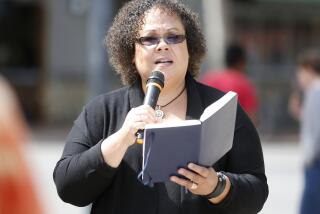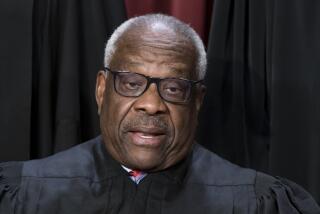Acquaintance Claims Hill Fantasized About Romance
WASHINGTON — A former law school classmate of Judge Clarence Thomas and acquaintance of Anita Faye Hill said in an affidavit made public Friday that Hill demonstrated an “ability to fabricate the idea that someone was interested in her when in fact no such interest existed.”
John N. Doggett III, an international management consultant in Austin, Tex., said in the document that during a 7 1/2-year period that he lived in Washington, Thomas never mentioned “any personal interest in Anita Hill or any other woman. In fact, he never talked about sex or pornographic films.”
“Anita Hill, on the other hand, made it very clear that she wanted to get to know me on a social and personal level and acted in a way that is, in my opinion, totally at odds with her claims that she was the victim of sexual harassment,” he said. “She also made it very clear that she was very proud to know Clarence Thomas and to have worked with him.”
Doggett’s affidavit, which was prepared on Thursday, was quickly distributed by Senate Republicans on Friday in an effort to discredit Hill’s allegations made before the Senate Judiciary Committee hearing on the nomination of Thomas to be a justice on the Supreme Court.
Doggett said in his sworn statement that he left a going-away party for Hill, just before she moved from Washington to Oklahoma, with the impression that “she was somewhat unstable and that in my case, she had fantasied about my being interested in her romantically.”
Under questioning from Sen. Arlen Specter (R-Pa.), who played a leading role for Republicans in challenging Hill, the witness testified that she barely remembered Doggett and that his statements were not accurate.
“I did not at any time have any fantasy about a romance with him,” she testified.
Doggett said he met Hill in 1982, at a meeting of African-American lawyers in Washington. Hill at the time worked for Thomas at the Department of Education. Doggett, working in Washington at the time, had been a classmate of Thomas’ at Yale Law School, which Hill also attended several years later.
He and Hill encountered each other from time to time over the next two years while they both lived in the same neighborhood, talked about meeting “some time for a drink or dinner,” but did not date, he said.
Then, at the going-away party, he said, Hill approached him and said: “I am very disappointed in you. You really shouldn’t lead on women and then let them down.”
Doggett said he asked her what she meant and “she stated that she had assumed that I was interested in her.”
Saying her comments “stunned” him, Doggett said he “told her that I felt that her comments were totally uncalled for and completely unfounded.”
“It was my opinion at the time and is my opinion now that Ms. Hill’s fantasies about my sexual interest in her were an indication of the fact that she was having a problem with ‘being rejected’ by men she was attracted to,” he said in the statement.
He continued:
“Her statements and actions in my presence during the time when she alleges that Clarence Thomas harassed her were totally inconsistent with her current descriptions and are, in my opinion, yet another example of her ability to fabricate the idea that someone was interested in her when in fact no such interest existed.”
More to Read
Get the L.A. Times Politics newsletter
Deeply reported insights into legislation, politics and policy from Sacramento, Washington and beyond. In your inbox three times per week.
You may occasionally receive promotional content from the Los Angeles Times.










